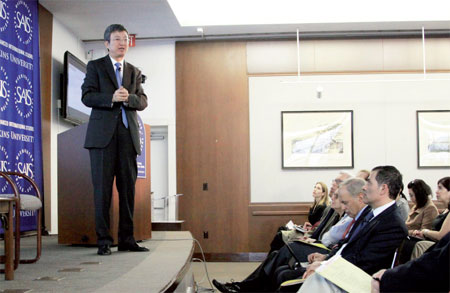Embrace consumption, IMF's Zhu urges China
Updated: 2013-03-13 11:24
By Chen Weihua in Washington (China Daily)
|
||||||||
|
IMF Deputy Managing Director Zhu Min speaks at a seminar held Tuesday at the Paul H. Nitze School of Advanced International Studies of John Hopkins University in Washington. Sun Chenbei / China Daily |
A top International Monetary Fund official warned on Tuesday of the need for China to follow through on plans to shift its economy from an investment-driven model to one that relies on domestic consumption.
Zhu Min, one of the IMF’s three deputy managing directors, said the key to this transition is economic reform and the quality, rather than the rate, of growth.
Chinese GDP grew 7.8 percent in 2012, better than the government’s adjusted forecast of 7.5 percent. Although it was China’s slowest rate of economic expansion since 1999, the performance was among the strongest in the world. This year, GDP is expected to grow 8 percent to 8.25 percent.
Zhu pointed out that China’s economy has been moving from a long-established focus on exports to investment. However, the 48 percent of Chinese GDP that investment accounted for last year was far too high, he told a seminar at Johns Hopkins University’s Paul H. Nitze School of Advanced International Studies in Washington.
Overcapacity is a major challenge in China, where utilization of manufacturing resources has dropped to 60 percent, a level Zhu described as risky.
“Over-investment is a big concern and the quality of growth is a big concern,” he said.
Zhu, who assumed his current post in July 2011, blamed over-investment for constraining wages of Chinese workers. Household income is still a very small share of the country’s economy, he said.
To maintain growth at or near current levels, China needs to keep moving toward consumption as its key economic driver, the IMF official said.
This goal is stressed in the government’s 12th Five-Year Plan, which runs through 2015, as well as a work report delivered last week by Premier Wen Jiabao at the National People’s Congress.
The transition has sparked heated debate in China, and Zhu said on Tuesday that although people talked about this, the key issue is how to make the shift.
The lesson learned from the world economy is that consumption shouldn’t be supported or stimulated by government spending, or by issuing debt or credit, according to Zhu, a former vice-governor of the People’s Bank of China.
“I think this is a very risky issue,” he said.
The government poured 4 trillion yuan ($643 billion) into its stimulus plan about four years ago, helping revive its economy amid the global slowdown. In recent years, China has surpassed Germany and Japan to rise from fourth to second on the list of the world’s biggest economies.
An IMF paper released in November estimated that China has over-invested by 10 percent to 20 percent of GDP.
Since the beginning of 2013, investment has continued apace, as seen in the sums of money that continue to pour into China’s reinvigorated real estate market.
Zhu believes there are several things the central government could do to boost domestic consumption.
“Number one, you should give people more opportunities to work and then to earn more money, so they will be able to consume more,” he said. “I think this is the most important thing and will be the driving force for China’s growth strategy in the next few years.”
Zhu suggested that China further open its services sector to allow more competition while crafting supportive tax and fiscal policies, particularly for small and medium-size companies. These measures, he said, would go a long way raising levels of individual income.
The IMF official also said Beijing should increase spending on health, education, pensions and other social programs, which would help allay public concerns about the economy and encourage citizens to spend more.
Zhu said the government should have a policy to discourage investment. Interest rates on loans are too low, while necessities such as energy, transportation, water and electricity are extremely cheap, fueling excessive expansion of certain parts of the economy.
However, Eswar Prasad, a professor at Cornell University in New York and a former China division chief at the IMF, suggested last month that it’s wrong to think of Chinese GDP growth as continuing to be driven by exports and investment.
“China has made substantial progress on reducing its external imbalance, with the surpluses on both the current account and the trade balance falling sharply from their peaks in 2007,” Prasad said at a hearing of Congress’ US-China Economic and Security Review Commission.
But he also pointed out that the major challenges for China remain as they have been for a few years: implementing reforms to improve the quality and efficiency of growth, continuing to shift from capital-intensive production, creating jobs and helping more of the benefits of growth to reach Chinese households.
chenweihua@chinadailyusa.com
(China Daily 03/13/2013 page1)

 In Photos: 7.0-magnitude quake hits Sichuan
In Photos: 7.0-magnitude quake hits Sichuan
 Li Na on Time cover, makes influential 100 list
Li Na on Time cover, makes influential 100 list
 FBI releases photos of 2 Boston bombings suspects
FBI releases photos of 2 Boston bombings suspects
 World's wackiest hairstyles
World's wackiest hairstyles
 Sandstorms strike Northwest China
Sandstorms strike Northwest China
 Never-seen photos of Madonna on display
Never-seen photos of Madonna on display
 H7N9 outbreak linked to waterfowl migration
H7N9 outbreak linked to waterfowl migration
 Dozens feared dead in Texas plant blast
Dozens feared dead in Texas plant blast
Most Viewed
Editor's Picks

|

|

|

|

|

|
Today's Top News
Live report: 7.0-magnitude quake hits Sichuan, heavy casualties feared
Boston suspect cornered on boat
Cross-talk artist helps to spread the word
'Green' awareness levels drop in Beijing
Palace Museum spruces up
First couple on Time's list of most influential
H7N9 flu transmission studied
Trading channels 'need to broaden'
US Weekly

|

|








